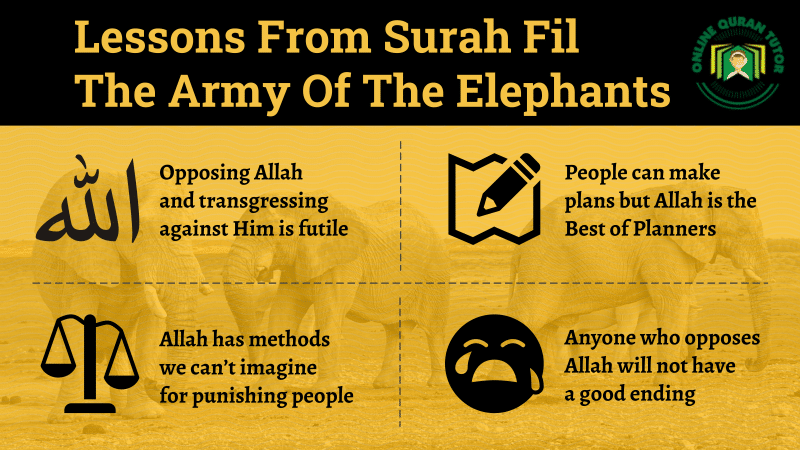The Quran is a book containing a wealth of information for Muslims. Some Muslims have the misconception that the Quran is only a book of rituals. Others think that it only contains religious injunctions. However, what many don’t realize is that the Quran contains many stories from the past for our benefit. These stories teach us helpful lessons. The story of the army of elephants in Surah Fil is one of those beneficial stories.
Surah Fil means Chapter of the Elephant. It covers the history of an incident that took place in the year that Prophet Muhammad (S) was born. Meccans and the Kaabah were under attack. Allah, in this Surah, documents how He foiled the plans of the tyrannical oppressors who attacked the land.
According to scholars, Allah likely revealed this Surah during the Meccan era. It was during the first portion of prophethood that Allah generally revealed stories in the Quran. His purpose for doing that was to provide parables and to show the Muslims and the disbelievers what happens to those who disobey Allah and go against Him.
Background
According to many reports relating to Surah Fil, the Abyssinians were the rulers of Yemen during this time. Their ruler was a man by the name of Abraha. Abraha saw the immense benefits of the pilgrimage that people all over the Arabian Peninsula made to Makkah. Seeing this, he decided that he would establish a huge church in Yemen to try and make people come to his land instead.
When this plan failed to materialize, Abraha was angry and decided to utilize a policy of aggression toward the Arabs. He readied an army led by 13 elephants and rampaged through the Arab lands. His final goal was to destroy the home of pilgrimages, i.e., the Kaabah.
He ruthlessly defeated all the opposition he came up against then moved toward Makkah. However, his elephant, at that point, refused to go toward the city.
Surah Fil: Verse 1
Have you not considered, [O Muhammad], how your Lord dealt with the companions of the elephant?
Allah addresses the Prophet (PBUH) and asks him to remember how He dealt with the army of the elephants. As an opening verse, this immediately draws the reader and listener’s attention toward the event. It shows us that it was something significant that took place.
This verse also serves to remind people that those who transgress may face severe punishment in this life as well, let alone the next. Despite the idols in the Kaabah at the time, Abraha coming to destroy them for his own economic gain was undoubtedly an act of transgression. As a result, Allah punished him.
Surah Fil: Verse 2
Did He not make their plan into misguidance?
Allah reminds us of a principle that he stresses upon in many places in the Quran. People may plan and plot. However, Allah’s plans are the best and most effective ones. Abraha and his army focused on defeating the Arabs. However, their plan did not and could not include opposing the will of Allah.
Allah willed that He will protect the sanctity of the Kaabah on that day. As a result, Allah foiled and turned the well-constructed plans of Abraha and his men into misguidance.
Surah Fil: Verse 3–4
And He sent against them birds in flocks, striking them with stones of hard clay.
In these two verses, Allah describes how His plan overcame the plan of the aggressors. Allah says that He sent birds to attack the convoy in flocks. The words used in Arabic in this verse are ‘Thayran Abaabeel.’
According to scholars and people who analyzed the Quran, this doesn’t refer to a specific type of bird. Rather, it’s many birds. The phrase ‘Thayran Abaabeel’ in Surah Fil means many birds following each other, or many birds coming from many different directions. What’s clear here is that the enemy was overwhelmed. ‘Ibn Abbas reportedly said that the birds had snouts that were like beaks of birds, while their paws were like those of dogs.
Hence, we can surmise that it would have taken a massive number of birds to overwhelm an army. Allah goes on to say that the birds struck the army with stones of hard clay. ‘Ibn Hisham said about this that the word ‘Sijjil’ actually refers to rocks of two types, i.e., stone and clay. Therefore, the birds attacked the army in a manner that completely overwhelmed them. It was as though it was raining stones upon them.
Surah Fil: Verse 5
And He made them like eaten straw.
This verse refers to the terrible outcome of Abraha’s army’s attempt to obliterate the Kaabah. They completely failed in their plot against the House of Allah. Allah destroyed then en masse and ended them and their plans, all with the use of birds and pebbles.
Aftermath
According to historians, Abraha was severely injured, but he managed to flee back to Yemen. He was badly wounded and in such terrible condition that his people were afraid to even think of launching a counterattack.
‘Ibn Kathir provides some more details about this event in his Quran Tafseer of Surah Fil. He says that all members of the army were either dead or severely injured. Abraha fell into the latter category. However, he was completely split open, to the extent that his wounds meant his inner organs were exposed. When he reached his land, he told his people what happened, then died.
According to ‘Ibn Kathir, it was Sayf al-Himyari in latter years who sought the help of the Persians to fight the Abyssinians. As a result, the Arabs of Yemen got their land back from them, and it was a sovereign land once again.
Lessons from surah Fil
Surah Fil shows us the futility of opposing Allah and especially being aggressive against His signs on Earth, such as the Kaabah.
It also shows us that people can make plans all they want; however, their plans pale in comparison to Allah’s plans because He is the Best Planner.
The attack of the birds – something that humans aren’t accustomed to – shows that Allah has His ways of punishing his opponents. No one can comprehend the means that He uses against His enemies.
Last of all, we see in Surah Fil that if anyone opposes Allah and transgresses against Him, he does not meet a good ending. Allah is the All-Powerful Creator of the Heavens and the Earth, and He can do as He pleases. Therefore, waging war against Him is futile and will always end in disaster
Conclusion
In conclusion, Surah Fil, the Chapter of the Elephant, illustrates the profound lessons within the Quran’s stories. It highlights the consequences of opposing Allah and His signs on Earth. The defeat of Abraha’s army by birds and stones serves as a powerful reminder of Allah’s ultimate control and the futility of opposing divine will.
.





